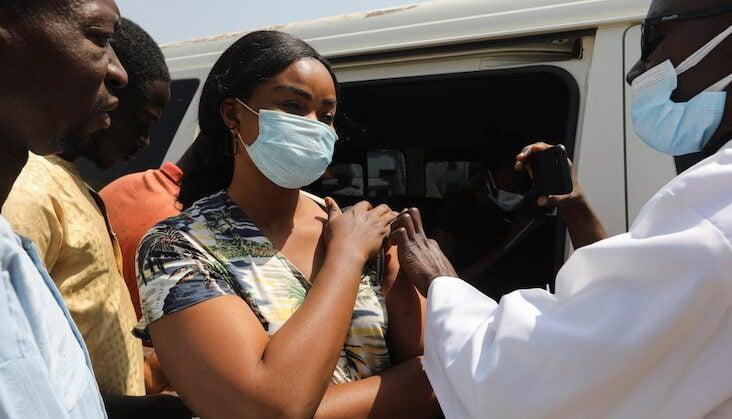By Ibrahim Mayaki
Africa-Press – Lesotho. While safe and effective Covid-19 vaccines and treatments were developed in record speed and at unprecedented volumes, they still haven’t reached the vast majority of Africans who need them.
After two years of this pandemic, African families are rightfully angry and frustrated that they are at the back of the global line for these lifesaving products.
Covid-19 has made it clear that African nations must work together to strengthen domestic health manufacturing capacity for medical products and medical supplies.
To accomplish this, Africa needs a strong regulatory framework that encourages the expansion of domestic medical product development, ensures the quality of medicines made and sold here, boosts public and industry confidence in our pharmaceutical and health care systems, and adds to the economic health of the continent by supporting manufacturing jobs and possibly creating export markets for these quality products.
The AU recently took a big step forward in this regard after at least 15 member states ratified the treaty to create the African Medicines Agency (AMA), a new continent-wide regulator that will complement national and regional efforts to protect and promote public health in Africa.
Of course, the need for strong medical product regulations didn’t start with Covid-19. Insufficient access to quality, safe, effective, and affordable medical products in Africa has posed challenges to public health for decades.
A 2017 WHO analysis found 42% of all fake medicine reports in the previous four years were from Africa, and other studies suggest as much as 70% of drugs in some African countries are fake. These substandard and falsified products are a menace to Africa.
Research estimates that more than 100,000 children in sub-Saharan Africa die each year because of poor-quality anti-malarial drugs, and 79,000-116,000 more children die from pneumonia each year for the same reason – a terrible loss to comprehend.
Several case studies have reported children in hospitals dying needlessly from infectious diseases because medicines contained a small fraction of the claimed active ingredient.
Effective regulation of markets is key here: poorly regulated markets keep quality medicines out as producers are unwilling and unable to compete with substandard and falsified alternatives.
Even when medical products are high quality, the lack of an efficient regulatory ecosystem often postpones their introduction into African communities.
Historically, requirements for registering new drugs can vary significantly across nations, increasing the time, money, and effort required to register the same drug in different countries.
One 2012 study found it took four to seven years on average to register a new product in sub-Saharan Africa, compared to just 6 to 12 months in high-income regions.
As a result, many Africans have access to fewer quality drugs and medical tools than those in wealthier nations, yet perversely must pay higher prices for them due to shortages and lack of competition.
The lack of clear, efficient, science-based regulatory pathways also discourages drug companies from pursuing approvals at all, even though their innovations are often needed here the most. This has had profound human and economic costs for African communities. That said, things have been changing for the better.
Over the past ten years, under the leadership of the AU Development Agency’s African Medicines Regulatory Harmonisation initiative, much has been accomplished at regional and national levels to harmonise technical standards and optimise regulatory processes on the continent.
According to a PLOS Medicine report on the East African Community, registration times dropped from 24-36 months in 2012 to 8-14 months in 2017. The AMA was established to build on this progress and complement national and regional efforts in developing a robust, predictable, accountable, and efficient regulatory system for health products.
Rather than having to negotiate 55 times, drug and medical device companies would be able to deal with one assessment process and get one recommendation, which could be used by all African countries to authorise the product nationally.
By working with AMA to align health procedures, African governments will accelerate the delivery of drugs and medicines, ensure their high quality, and lower costs by reducing redundancies and increasing competition.
Equally important, a robust African regulatory regime will build public confidence in drugs made in the continent, root out fake and counterfeit products, and create the necessary conditions for the stronger domestic medical manufacturing sector needed for future pandemics and disease outbreaks.
That’s why, as part of the EU-AU Summit this week, a group of international donors including the Bill & Melinda Gates Foundation and the European Commission have answered the call put forward by the AU with an announcement of more than €100m funding.
This will support AMA and other African regulatory initiatives, strengthen Africa’s regulatory capacity, and improve access to quality, affordable drugs and vaccines across the continent. This financial assistance is vital.
But to succeed in their critical mission to improve Africa’s regulatory framework, AMA and its sister regulatory organizations will also need the support and collaboration of African governments and industries.
When Africa can assure that all medical products here, whether locally manufactured or imported, meet international standards of safety, quality, and efficacy, our domestic health and manufacturing sectors will flourish and more African citizens will be able to get lifesaving vaccines, drugs, and medical supplies right when they need them.
https://www.theafricareport.com/178473/africas-health-security-requires-strong-african-regulators/
For More News And Analysis About Lesotho Follow Africa-Press






